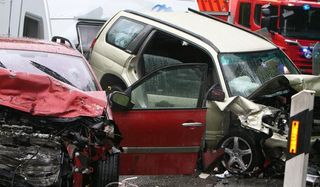Teen Highway Fatalities Drop with Limits on Licenses

Placing limitations on teens' licenses to drive and gradually granting them privileges, such as driving at night or with friends, dramatically reduces the rate of fatal crashes among teen drivers, a new study shows.
After graduated licensing laws were adopted, the rate of fatal crashes among 16- and 17-year-olds fell by 8 to 14 percent, the researchers found. Such laws were adopted in varying degrees by all 50 states and the District of Columbia between 1996 and 2011.
"States have followed a variety of approaches to their legislation about graduated driver licensing laws," study researcher James C. Fell, of the Pacific Institute for Research and Evaluation (PIRE) in Calverton, Md., said in a statement. "These findings on nighttime and passenger restrictions might be useful to states wishing to make their graduated licensing programs more effective."
Researchers at PIRE looked at data from a national database of fatal crashes maintained by the National Highway Traffic Safety Administration. Analyzing records that spanned from 1990 to 2007, the researchers compared the rates of fatal crashes of 16- and 17-year-old drivers with those of 21- to 25-year-old drivers.
The study also showed that the effectiveness of each state's laws in preventing fatal teen driver crashes was determined by the extent of its restrictions.
The most effective legislation had at least five of seven key elements: a minimum age of 16 for a learner's permit, a six-month waiting period before a driver with a learner’s permit can apply for a provisional license, 50 to 100 hours of required supervised driving for obtaining a license, a minimum age of 17 for a provisional license, restrictions on driving at night, a limit on the number of teenage passengers allowed in the car and a minimum age of 18 for a full license.
States with laws restricting the number of teen passengers in a car driven by a 16- or 17-year-old reduced fatal crashes with teen passengers by 9 percent, according to the study. And nighttime driving restrictions for teens brought a 13 percent drop in in nighttime crashes involving 16-and 17-year-old drunk drivers, compared with states that did not have such restrictions.
Sign up for the Live Science daily newsletter now
Get the world’s most fascinating discoveries delivered straight to your inbox.
The researchers concluded that laws that established a midnight curfew for provisional drivers were the most effective at reducing nighttime crashes.
A separate analysis showed that the laws were more effective at reducing alcohol-related fatalities than those in which speed was a factor.
That analysis also noted graduated driver's licensing laws did not appear to reduce fatalities among Hispanic teen drivers, as they did among Caucasian, African-American and Asian teenagers.
Pass it on: Placing limitations on teens' driving licenses dramatically reduces the rate of fatal crashes among teen drivers.
Follow Remy Melina on Twitter @remymelina, and follow MyHealthNewsDaily @MyHealth_MHND. Like us on Facebook.
Most Popular



